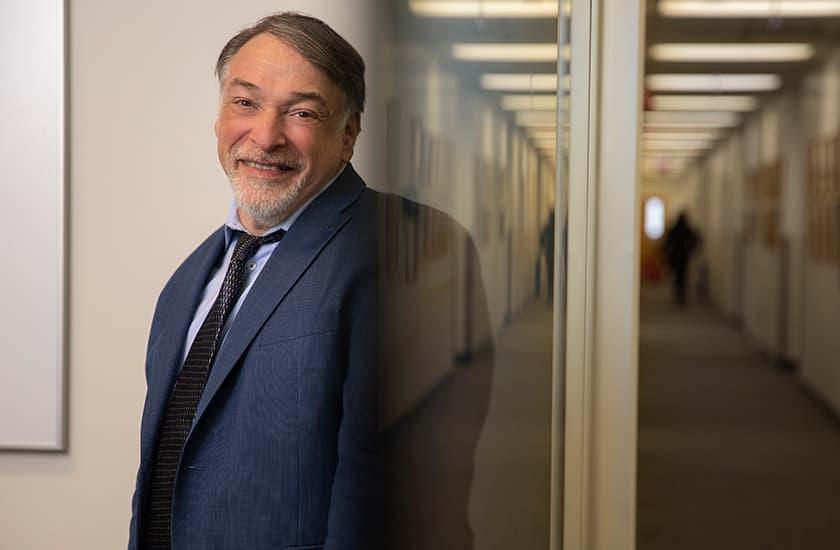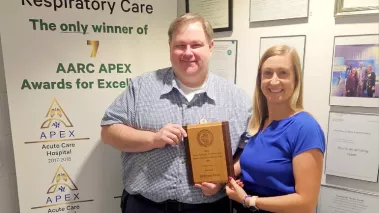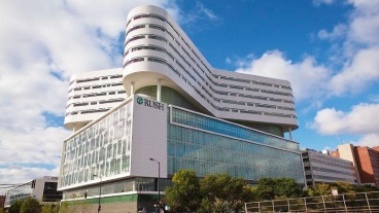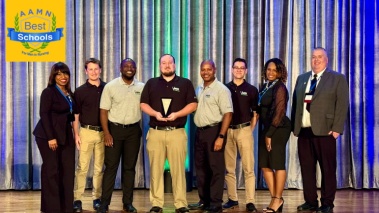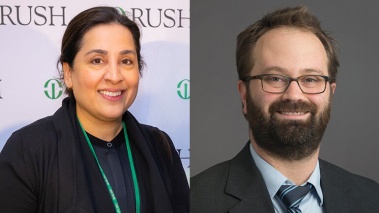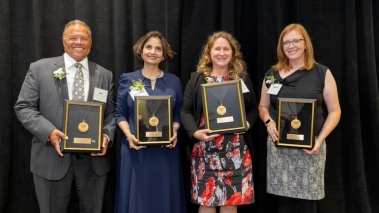Health sciences education is rapidly evolving, and one of the innovators driving that change is David Katz, PhD, ABPP, vice provost of academic affairs and chief knowledge officer at Rush University. In January, Katz became the first leader to take on this new dual role at Rush.
Katz is responsible for creating a learning environment that supports academic excellence through innovation, collaboration and technology. He oversees several critical areas within the university, including the library, the Office of Interprofessional Education, the Rush Center for Clinical Skills and Simulation, the Center for Teaching Excellence and Innovation, the Human Anatomy Laboratory, and the Office of Interprofessional Continuing Education.
Prior to joining Rush, Katz was dean of the Graduate School of Arts and Social Sciences at Lesley University in Cambridge, Mass. Before taking the position at Lesley, Katz was chair of the psychology department at Adler University in Chicago.
Now that he has returned to Chicago, Katz has significant plans for Rush. In this Q&A, he discusses his goals for his new position and what got him here.
How did you get started in academia?
I grew up in Israel and received my bachelor’s degree in psychology, sociology and anthropology from the University of Haifa. After working for a few years in Israel, I decided to pursue a master’s degree in clinical psychology at Eastern Kentucky University. I later earned my doctorate in counseling psychology from the University of Kentucky, focusing on clinical neuropsychology and medical behavioral sciences. Moving to Kentucky was a bit of a culture shock, but I learned to love Kentucky during my six years there.
My first position as a visiting assistant professor was in the Department of Occupational Therapy at Indiana University Purdue University Indianapolis (IUPUI), where I taught behavioral health courses. I have a lot of appreciation for occupational therapists because I had OT as a child for cerebral palsy.
After IUPUI, I was a neuropsychology fellow at McLean Hospital, the psychiatric teaching hospital of Harvard Medical School. Then I moved to Vancouver to become a neuropsychologist in the epilepsy program at Vancouver General Hospital. At Vancouver General, I decided to get more involved in academic administration. After that, I went to the California School of Professional Psychology at Alliant International University and directed their doctorate program in clinical psychology for three years. Then I came to Chicago to work at Adler for five years before taking the dean position at Lesley for two years.
Like Rush, Lesley is focused on training professionals in a variety of areas. It was exciting to work at Lesley because we were able to take our curricula for practice-oriented professions like art therapy, drama therapy and dance therapy and translate them to fit a more hybrid model that includes online learning.
You also helped transform the clinical psychology program at Adler. What did you do there?
At Adler, our goals were to modernize the curriculum and make sure that what we were teaching was actually being learned. To that end, we included more assessments in the curriculum and reviewed the practicum to make sure students were able to carry over what they were learning in the classroom into their clinical practice.
What attracted you to this new role at Rush?
I have known about Rush and its excellent programs since my days as a graduate student in neuropsychology. Rush has one of the best internships in clinical neuropsychology in the country. So coming to Rush meant a great deal for me. As for the role, it encompasses everything that I enjoy in academia and academic affairs including program and curricular development, enhancing the teaching environment and infusing new approaches to teaching, and elevating academic programming to the next level. Building a new division of academic affairs here at Rush is exciting for me and I am looking to work with faculty, students, and staff.
What trends are you seeing in education?
During the past 10 to 15 years, we saw important neuroscientific research about learning and witnessed the development of innovative technologies and strategies in education. As a result, we are looking at learning and teaching differently. One of my goals is to thoughtfully adapt these developments to make sure we’re not only training students for the current environment, but also for what’s coming 10 and 20 years from now. Another trend is the creation of interdisciplinary areas of study and practice. By interdisciplinary I mean two or more disciplines that develop into a new discipline like health informatics or population health. I hope to see such programs develop at Rush.
What are some of your other goals in this new role?
I want to collaborate on academic programming that supports the curriculum and provides the best experience for students and faculty.
Another goal is to promote diversity and equity. Rush has already done significant work in this area, but we need to continue to infuse these principles into the curriculum so students are prepared to work with diverse populations. At the same time, we need to continue to attract diverse faculty, staff and students, which I see as part of my role.
You’ve also been active in community service over the years. Can you talk about your work to help protect LGBTQ refugees?
I’ve volunteered with organizations in Vancouver, Chicago and Massachusetts that provide legal aid and counseling services to the LGBTQ community. As a gay man, this issue is important to me personally, but it goes beyond that because I value diversity and seek a more equitable environment for everyone.

